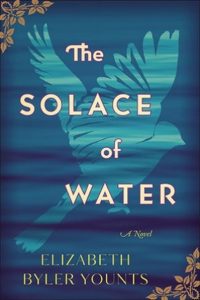The historical novelist explains why what connects us is so much more important than what divides us.
Women’s fiction writer Elizabeth Byler Younts gained a worldwide audience through her first book, Seasons: A Real Story of an Amish Girl. She has consulted on Amish lifestyle and the Pennsylvania Dutch dialect for two award-winning television shows. Her latest novel is The Solace of Water (Thomas Nelson), which offers a glimpse into the turbulent 1950s and reminds us that friendship rises above religion, race, and custom—and has the power to transform a broken heart. In this interview, the author shares how writing this novel was a different experience for her, outlines the challenges of writing about characters with a different frame of reference, and how her faith infuses her stories…
What can you tell us about The Solace of Water?
 The Solace of Water ultimately is a story of unlikely friendship. The reader will meet two women who have isolated themselves from their communities due to their own burdens. When Delilah Evans moves to Pennsylvania and meets Emma Mullet, a reclusive Amish woman, no one anticipates the friendship that they will build.
The Solace of Water ultimately is a story of unlikely friendship. The reader will meet two women who have isolated themselves from their communities due to their own burdens. When Delilah Evans moves to Pennsylvania and meets Emma Mullet, a reclusive Amish woman, no one anticipates the friendship that they will build.
Fighting against their instincts to balk at their differences and desire to hide their personal demons from each other, Delilah’s daughter Sparrow still forces the two together. This sets them on a course of forgiveness, laying down bitterness, and taking a firm grip on true hope.
The novel involves finding common ground among divided communities. How much of that theme is driven by your own experiences?
After leaving home for college and then, a few years later, marrying into the Air Force, I began to really see how divided American culture is—race, religion, politics, socioeconomic, and even football…and so much more. I began to recognize my own judgments and attitudes when I encountered someone who had a vastly different way of viewing things.
For years, the pervading themes on social media are political and divisive. They hurt people, friendships, marriage, and skew so much of the view we hold about another person. What I realized, however, was when I was sitting at a table with some friend I might not agree with on Facebook, I still found a human I deeply loved.
I found that this person was speaking from their decades of life just as I was—trauma, burdens, soul-shaping experiences. Disagreements didn’t need to be spoken about because there was no time. There was too much good that connected us. These real connections are powerful if we allow them to be.
I didn’t write The Solace of Water as a manifesto or as an activist, but just as a woman trying to desperately remind myself that there’s no limit to love. Jesus proved that on the cross, and I need to do my best to live it out. The Bible doesn’t tell me to be selective in my sisterly love—it’s actually the exact opposite.
How similar are your experiences to those of the characters? Or were your own experiences just the spark?
The previous books were directly linked with the history of my family. Those memories and stories sparked a plot to write about.
The Solace of Water was entirely different. It was what I’d call a soul book. It started forming in my mind years before it was contracted. I just couldn’t get these women out of my mind, and I knew that this wasn’t just my family heritage surfacing, there was something deeper I needed to explore.
When, in my mind, I saw an Amish woman and an African American woman reaching out for each other in desperation, I needed to know their story. So, I began to dig.
Click through to find out the character that surprised her the most!


